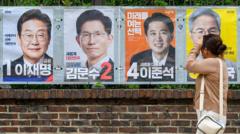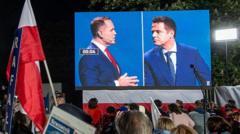As South Korea approaches its presidential election, labor inequality takes center stage with Kim Hyoung-su’s extraordinary protest at the top of a 98-foot-tall traffic camera tower in Seoul. For 77 days, Kim has remained in his makeshift shelter, drawing attention to the plight of subcontracted workers who face significant economic disparities compared to their directly hired counterparts.
South Korean Workers' Struggle: Protesting from Great Heights

South Korean Workers' Struggle: Protesting from Great Heights
Temporary workers in South Korea, exemplified by Kim Hyoung-su's protest atop a tower, highlight systemic labor issues in presidential debates.
Kim's circumstances represent a broader issue affecting thousands of workers in the Hanwha Ocean shipyard, a key player in the nation’s economy. Despite sharing the same job responsibilities, these subcontracted employees earn only half the wages of those directly employed by the company. Kim's protest, which began on March 14, symbolizes a desperate fight against perceived discrimination further amplified by the upcoming presidential election.
“Living in such confinement feels like being in a cage,” Kim expressed, underscoring the challenges faced by workers who strive for recognition and equality in their working conditions. As he remains isolated, his message juxtaposes the vast struggle of laborers against the backdrop of a political campaign, with candidates divided in their responses to labor reform. His story reflects the urgent need for a reevaluation of labor practices in the country, showcasing the sacrifices made by individuals like Kim in the pursuit of equity and recognition.
“Living in such confinement feels like being in a cage,” Kim expressed, underscoring the challenges faced by workers who strive for recognition and equality in their working conditions. As he remains isolated, his message juxtaposes the vast struggle of laborers against the backdrop of a political campaign, with candidates divided in their responses to labor reform. His story reflects the urgent need for a reevaluation of labor practices in the country, showcasing the sacrifices made by individuals like Kim in the pursuit of equity and recognition.




















